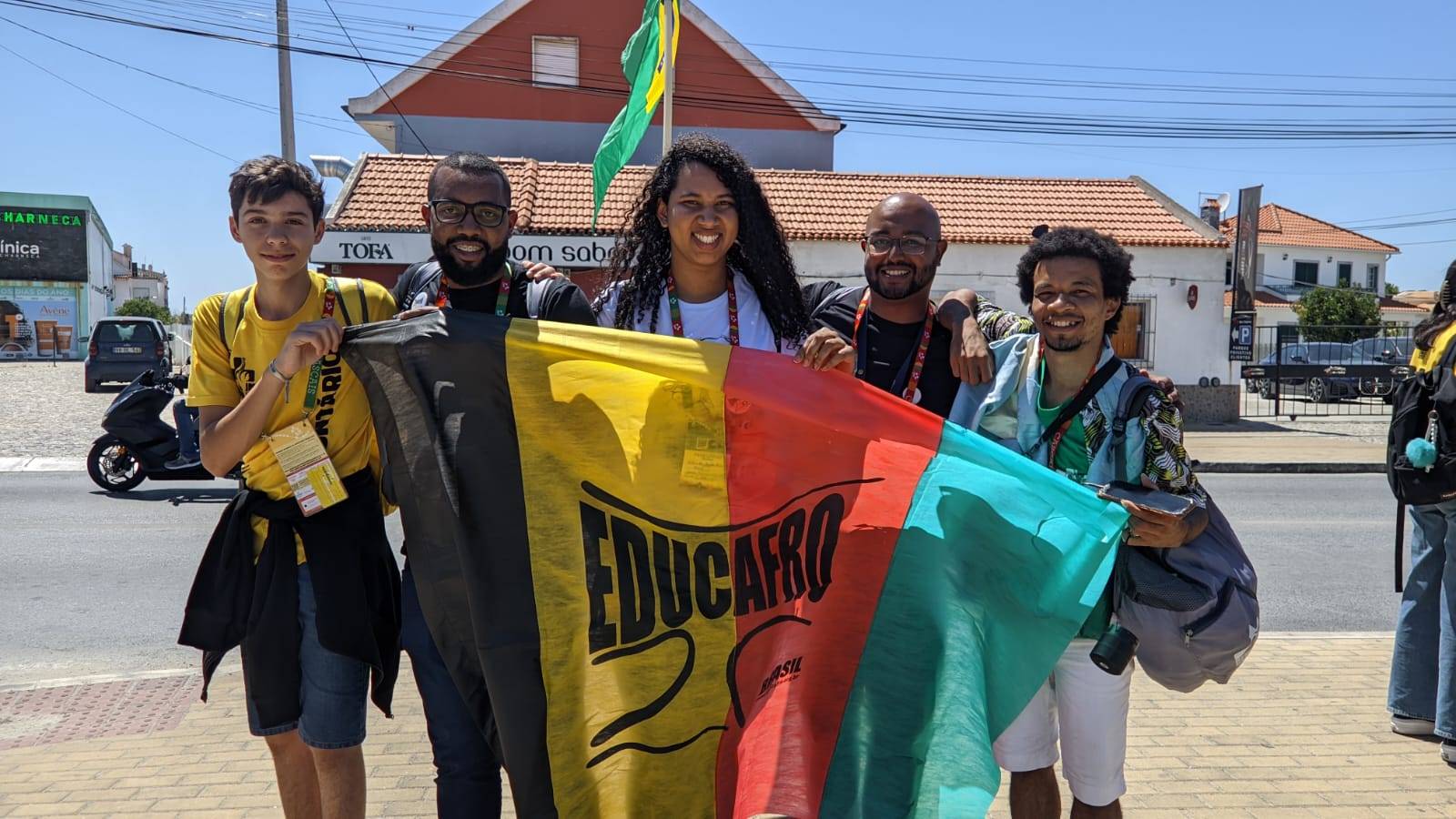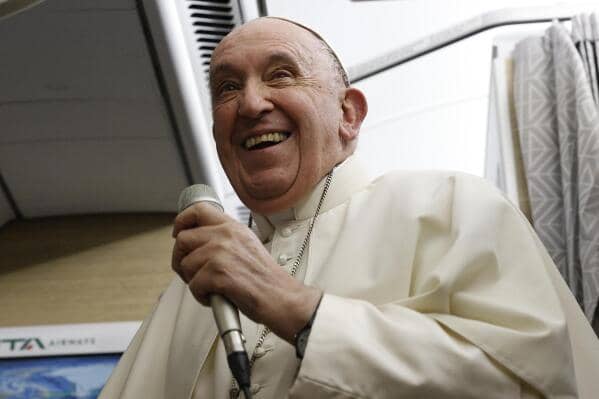LISBON – In the wake of a devastating clerical sexual abuse scandal in a country already buffeted by secularization and increasing pluralism, Pope Francis at the end of his first day in Portugal offered words of comfort, urging bishops not to be overcome by discouragement.
Referring to the Gospel passage in which Jesus tells Peter and other fisherman to cast their nets out again despite a full night of fishing with no catch, the pope said that as pastors, “we can feel a similar weariness, when we seem to be holding only empty nets.”
“This is not uncommon in countries of ancient Christian tradition, buffeted by social and cultural changes and increasingly marked by secularism, indifference to God and growing detachment from the practice of the faith,” he said, alluding to Europe’s progressively empty pews, a trend worsened by the COVID-19 pandemic.
Feelings of discouragement are often compounded “by the disappointment and anger with which some people view the Church, at times due to our poor witness and the scandals that have marred her face and call us to a humble and ongoing purification, starting with the anguished cry of the victims, who must always be accepted and listened to.”
The pope’s visit comes just six months after Portugal published the results of a devastating report done by an independent commission investigating clerical sexual abuse in the Portuguese Catholic Church, which estimated there have been roughly 5,000 victims since 1950.
The report, published Feb. 13, found that at least 4,815 children had been abused by members of the Catholic Church in Portugal over the past 70 years, but cautioned that this was likely just the “tip of the iceberg.”
RELATED: Portugese church estimates almost 5,000 abuse victims since 1950
Following the scandals, the Portuguese Bishops’ Conference (CEP) apologized and announced its decision to establish a new independent body tasked with listening to and accompanying victims, in addition to gathering further reports.
Pope Francis is expected to meet with a group of abuse survivors during his Aug. 2-6 visit to Portugal, though the details of that meeting have not been disclosed.
The main purpose of Francis’s visit to Portugal is to attend the international World Youth Day (WYD) gathering in Lisbon. He will preside over an official welcoming ceremony for the event, as well as the praying of the Via Crucis, a large prayer vigil, and a closing Mass. He is scheduled to visit the Marian shrine of Fatima on Saturday.
In his speech to bishops, priests, religious, deacons, seminarians, and pastoral workers Wednesday, the pope told Portugal’s shepherds that feelings of discouragement are often accompanied by “the nets of resignation and pessimism.”
“Instead, we need to bring those struggles and tears to the Lord, in order then to respond to pastoral and spiritual needs, together, with open hearts and finding new ways to follow him,” he said.
What God is asking, the pope said, is for the church’s pastors to again find an eagerness to go into the world and make it “exult in the comforting joy of the Gospel.”
“This is not the time to stop and give up, to drag the boat to shore or to look back. We must not take flight from the present out of fear, or take refuge in forms and practices of the past. Now is the God given time of grace to sail boldly into the sea of evangelization and of mission,” he said.
To this end, Pope Francis presented three choices for the country’s pastors, saying they must first “put out into the deep,” leaving behind feelings of disappointment and inertia, as well as the melancholy, cynicism and irony that can emerge when difficulties arise.
He urged Portugal’s shepherds to pass “from defeatism to faith” and stressed the importance of prayer, which focuses one on God and provides courage to set out “without ideologies or forms of worldliness, impelled by a single desire: that the Gospel be preached to all people.”
Another choice pastors must make is to “work together in offering pastoral care,” the pope said, and, to this end, pointed to the ongoing Synod of Bishops on Synodality.
“The Church is synodal: she is communion, mutual assistance and shared journey. That is the aim of the current Synod, which will have its first general assembly in October,” he said, referring to the Oct. 4-29 Synod, the first of two Rome-gatherings culminating the multi-year synodal process.
Launched by Pope Francis in 2022, the focus of the synod is to transform church life and structures to make it a more welcoming place for all of its members.
“On the boat of the Church, there has to be room for everyone: all the baptized are called on board to lower the nets, becoming personally involved in the preaching of the Gospel,” he said, noting that there are many places in which priests and religious are “hard pressed” due to dwindling numbers.
In these cases, pastors, he said, “can look at this as an opportunity for involving, with fraternal enthusiasm and sound pastoral creativity, the lay faithful.”
“I would put it this way: never a bishop without his priests and the people of God; never a priest without his brother priests; and all of us together, as Church…Without worldliness, to be sure, yet not without the world,” he said. “In the Church, we help each other, we support one another and we feel ourselves called to spread a climate of constructive fraternity beyond our own walls
Pope Francis said another choice the church’s pastors must make is to be “fishers of men,” capable of drawing people in and saving them from “the evil that threatens to overwhelm them, to revive them from every form of death.”
“There is so much darkness in today’s society, also here in Portugal. We seem to have lost a sense of enthusiasm, the courage to dream, the strength to confront challenges and to be confident about the future,” he said.
In this context, the Church, he said, has the task of “casting the nets of the Gospel, not pointing fingers but bringing to the men and women of our time an offer of new life, the life of Jesus.”
“Let us dream of the Church in Portugal as a ‘secure port’ for all those who face the straits, the shipwrecks and the tempests of life!” he said.
In a brief greeting to the pope, Bishop José Ornelas Carvalho of Leiria-Fatima and president of the Portuguese Bishops’ Conference voiced hope that WYD would help young people who come “to understand and dream the same dream of God by finding joyful, generous and innovative ways of participating in the church and in humanity.
Ornelas did not mention the abuse crisis, but said WYD is a celebration and an opportunity for the local church to show their closeness to the pope and his vision, saying local pastors feel challenged by Francis’s invitation to “open ourselves to the ‘joy of the Gospel’ in its simplicity and universality, which generates a just and fraternal Church and society.”
“We are also stimulated by your appeal for an ‘outgoing Church’, which offers all those excluded from the world – with particular attention to the plight of refugees,” he said.
He said the Church in Portugal is committed to Pope Francis’s synodal process and its path “of pastoral transformation, guided by the spirit of the Lord, in fraternal communion, in active participation and in the missionary outreach of our communities.”














